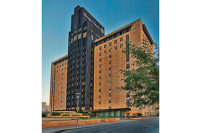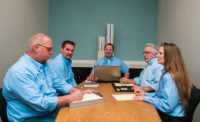Brad Taback doesn’t like to have all of his eggs in one basket. The 46-year-old owner of Climatech Inc., a Pittsburgh-based HVAC contractor strong in both commercial and residential markets, believes this diversification makes his company unique. Admittedly, most of Climatech’s business is in the commercial market, but Taback’s father started the business in 1972 as a residential company, and it continues to operate and grow in that market today.
“In Pittsburgh, there are a lot of either-ors,” Taback said. “There are a lot of large commercial mechanical companies who really don’t do residential, and there are residential companies who don’t do commercial. We are large in the commercial market, but we’re large in the residential market ,as well. We’ve always maintained our residential presence, and it’s grown over the years.”
Climatech manages separate commercial and residential divisions with different employees.
“We’re fairly diversified,” Taback said.
ECONOMICAL LEADERSHIP
Taback has come a long way for someone who never thought he would take over the family business. After graduating with a degree in economics from Indiana University, Bloomington, he took a sales job with a mechanical contractor in Chicago.
“I sold commercial service agreements there for four years and learned a lot about the business from a service perspective. Then, I got the ultimatum from my father, who said, ‘If I was going to come into the family business, I couldn’t wait until I was 40.’”
Taback moved back to Pittsburgh with his wife in 1996 and started working in all of the company’s departments, learning the business from the ground up.
“My goal at the time was to learn as much as I could about everything,” he said. “I spent time doing residential sales and as an estimator doing commercial estimating. I really worked through most facets of the business. I probably spent the better part of eight years working through all the different departments, getting a handle on everything we do.”
Upon his father’s retirement in 2005, Taback became president of Climatech. “My favorite thing about the industry is that our product is a necessity,” he said. “There’s always a need, whether it’s heating, cooling, or refrigeration; it’s a necessity, especially on the commercial side of things, as you can’t be without heating, cooling, or refrigeration in those settings. Our industry is not a fad. We’re not hot today and gone tomorrow. There’s always a need. It’s somewhat recession-proof.”
LEVERAGING TECHNOLOGY
In addition to operating in both residential and commercial markets, Climatech has expanded in two additional locations in Tampa, Florida, and Charleston, West Virginia.
Managing offices and employees in other states is not without difficulties, but Taback has taken full advantage of technology.
“I think the challenge is, I can’t react to things as quickly as I’d like to be able to,” he noted. “It’s not like I can jump in a car and be there in three hours. So, it is a little challenging. But, the technology in our industry — and technology, in general — has made operating businesses like that much easier. All of our trucks are equipped with GPS so I can see from my desk here [in Pittsburgh] where all my vans are down in Florida. We’re able to dispatch centrally from anywhere around the country. Technology has really made it so much easier.”
Climatech currently employs 150 people and boasts 100 trucks in its fleet, 50 of which are dedicated to service. While the bulk of Climatech’s operation remains in Pittsburgh, Taback says he has 12 employees in Tampa and six in Charleston. In 2014, the company’s revenue reached approximately $25 million.
In addition to employing the use of technology to manage his company, Taback also offers it to his customers and his technicians through Climatech’s software package.
ClimaTrak™ allows customers to login to see their HVAC service history, equipment orders, billings, and more.
“If you’re a facilities manager and you’ve got 10 buildings with all of this equipment in them, ClimaTrak will allow you to see the service history by piece of equipment, approve service calls and purchase orders, and really interact with us through that portal,” Taback explained. “This allows customers to see what and where they’re spending their money and budget for capital expenditures. If they need to replace equipment, they can see which pieces of equipment are costing them more per year. It just really is a nice tool for them to be able to manage their HVAC costs.”
The service is mostly for commercial clients, although any of Climatech’s customers may use the software. “We don’t charge for it, and we offer it to every customer. Some use it and some don’t; it depends on the needs of their businesses.”
Climatech technicians have access to a mobile app called TechAnywhere, which allows them to access job tickets, create orders, take signatures, and complete other day-to-day activities via their smartphones.
“[The app] has multiple benefits. It helps reduce our billing time from seven to 10 days [using paper] to two to four days using technology,” Taback said. “We’re able to get our bills out the door quicker, which, in turn, improves our cash flow.”
The app provides real value because technicians have better access to customers’ historical data, which allows them to download technical data from manufacturers for diagnosing and troubleshooting more quickly. This saves customers money, because, in most cases, they are billed for the time the technician spends on the job.”
Technology has also been one of the biggest changes to the business, according to Joe Saltmar, executive vice president, who was also Climatech’s first and only technician 43 years ago, when the company opened.
“When I first came to work with Climatech, we didn’t have any cell phones. All we had were two-way radios with the truck,” Saltmar said. “Now, I know I’m really dating myself here, but everything we did was dispatched by hand. We had a board with a piece of paper on it that indicated a service call that was under a service technician’s name, and it was all done manually. The administrative side of the business has changed dramatically. Now, all of our dispatching is done using software specifically designed for our industry.
“Additionally, on the technical side, the control systems are all electronic,” he continued. “Everything is designed to save energy, to make it easier for the technician to work on the equipment, and to make it more convenient for the customer.”
A GOOD PLACE TO WORK
Much like Saltmar, many of Climatech’s employees stick with the company for long periods of time “We have a good management team, and we give them a lot of support from the office to the field,” said Saltmar. “We try to listen to them and do whatever we can to make their jobs easier. We try to maintain a family atmosphere. Many of our employees have been with us for 20 years or longer, especially our technicians.”
After 15 years of service, Climatech technicians no longer have to serve on-call shifts.
“With the number of techs we have, they only have to do it [on-call] a couple of times a year,” Saltmar said. “But, for that week, they have to be available, and most of them hate it. After 15 years, once they hit that milestone, it’s difficult for them to leave because then they have to go back to being on-call with another company.”
Jason Metzgar, a service technician for Climatech, will hit his 20-year anniversary with the company in July. Metzgar started with the company at the age of 18, fresh out of high school and tech school.
“They hired me on as an apprentice, and it was a great opportunity,” Metzgar said. “I was fortunate, being a young and inexperienced technician, as the older guys here helped me and made sure I learned and became a good technician. This is just a very good company to work for — they take care of you.”
According to Metzgar, the on-call program is a big reason why Climatech attracts and retains employees. “As far as I know, we’re the only company in Pittsburgh that offers such a service. It’s a very nice perk to have, not having to worry about being on-call and giving up a week of your life every month or every couple of months.”
Jeff Miller, vice president, is a 33-year veteran with Climatech, having started as an accountant.
“Climatech had a lot of opportunity for growth, so I stuck around through the tough times, and, 33 years later, I’m still here,” Miller said. “I like the people in this industry, they’re down to earth. And, I like the small-company atmosphere. I’ve worked for Fortune 500 companies and I didn’t enjoy the corporate atmosphere. I like the fact that you encounter something new every day, even after being in this business for 33 years. Something new comes up all the time, so you’re never bored. Brad [Taback] is very easy going and gives me the freedom to do the things that I want in the way that I see they should be done with my own group of people.”
PLOTTING THE FUTURE COURSE
In the spirit of diversifying his business, Taback branched out in 2011 with the acquisition of a commercial refrigeration company called A-Tech Refrigeration. The company retains its own name and a separate location, but shares many of its administrative functions with Climatech. Starting in July, both companies will be operating under the same roof. Last year, Climatech added on 10,000 square feet to its existing facility with the intention of relocating A-Tech Refrigeration.
“Because of the synergy between the two markets, we’ve been able to piggyback off each other’s customers. It’s been good for both companies.”
Taback said he plans to continue to explore other acquisitions outside of Pittsburgh and Tampa.
“We’re in the commercial market, we do add-on residential replacements, and we’re also heavily involved in the new construction market. I’m always trying to diversify into as many different areas of the industry as we can. If the new home market crashes, I’ve got our commercial business; if the commercial market is down, we’ve got other areas that allow us to keep moving and keep people working. And that’s something I’m going to continue to do.”
According to Taback, the HVAC industry’s greatest asset is there will always be a need for the service. “With the technology going into the equipment, the level of sophistication is really growing significantly. At some point, a lot of the young people we’re losing to the technology industry will find their way back to this industry. The technology will bring people in.”
According to Taback, more than 300 competitors are operating in and around Pittsburgh. And, while he may not like the sheer number of his competitors, he thrives on the competition.
“One of the things I do enjoy is competing for the next job or service contract,” he said. “There’s nothing more rewarding than getting a job or landing a new customer. Given the level of competition, it’s a challenge to stay at the top, and that’s why I decide to come to work every day.”
Publication date: 6/22/2015
Want more HVAC industry news and information? Join The NEWS on Facebook, Twitter, and LinkedIn today!














